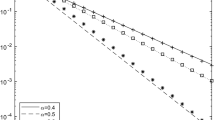Summary
Markovian queueing networks having overflow capacity are discussed. The Kolmogorov balance equations result in a linear homogeneous system, where the right null-vector is the steady-state probability distribution for the network. Preconditioned conjugate gradient methods are employed to find the null-vector. The preconditioner is a singular matrix which can be handled by separation of variables. The resulting preconditioned system is nonsingular. Numerical results show that the number of iterations required for convergence is roughly constant independent of the queue sizes. Analytic results are given to explain this fast convergence.
Similar content being viewed by others
References
Banegas, A.: Fast Poisson Solvers for Problems with Sparsity. Math. Comput.32, 441–446 (1978)
Ben-Israel, A., Greville, T.: Generalized Inverses: Theory and Applications. New York: Wiley 1974
Berman, A., Plemmons, R.: Nonnegative Matrices in the Mathematical Sciences. New York: Academic Press 1979
Chan, R.: Iterative Methods for Overflow Queueing Models. NYU Comput. Sci. Dept. Tech. Rep., 171, 1985
Cooley, J., Tukey, J.: An Algorithm for the Machine Calculation of Complex Fourier Series. Math. Comput.19, 297–301 (1965)
Daniel, J.: The Conjugate Gradient Method for Linear and Nonlinear Operator Equations. SIAM J. Numer. Anal.4, 10–26 (1967)
Elman, H.: Iterative Methods for Large, Sparse Nonsymmetric Systems of Linear Equations. Ph.D. thesis. Dapartment of Computer Science, Yale University 1982
George, A., Liu, J.: Computer Solution of Large Sparse Positive Definite Systems. Englewood, NJ: Prentice-Hall 1981
Hestenes, M., Stiefel, E.: Methods of Conjugate Gradients for Solving Linear Systems. J. Res. Natl. Bur. Stand.49, 409–436 (1952)
Hestenes, M.: The Conjugate Gradient Method for Solving Linear Systems. Proc. of Symposia in Applied Math., VI. New York: McGraw-Hill 1956
Kaufman, L.: Matrix Methods for Queueing Problems. SIAM J. Sci. Stat. Comput.4, 525–552 (1982)
Kleinrock, L.: Queueing Systems. Volume 1, Theory. New York: Wiley 1975
Luenberger, D.: Introduction to Linear and Nonlinear Programming. Reading: Addison-Wesley 1973
Neuts, M.: Algorithmic Methods in Probability. Amsterdam: North-Holland 1977
Parlett, B.: The Symmetric Eigenvalue Problem. New Jersey: Prentice-Hall 1980
Rudin, W.: Real and Complex Analysis. New York: McGraw-Hill 1974
Smith, B., Boyle, J., Dongarra, J., Garbow, B., Ikebe, Y., Klema, V., Moler, C.: Matrix Eigenvalue Routines-EISPACK Guide. Lect. Notes Comput. Sci. 6, 2nd ed. Berlin, Heidelberg, New York: Springer 1976
Van der Vorst, H.: Preconditioning by Incomplete Decomposition. Ph. D thesis. Rijksuniversiteit te Utrecht 1982
Varga, R.: Matrix Iterative Analysis. New Jersey: Prentice-Hall 1962
Author information
Authors and Affiliations
Rights and permissions
About this article
Cite this article
Chan, R.H. Iterative methods for overflow queueing models I. Numer. Math. 51, 143–180 (1987). https://doi.org/10.1007/BF01396747
Received:
Issue Date:
DOI: https://doi.org/10.1007/BF01396747




